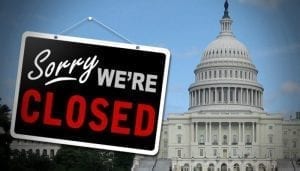Do you hear what I hear? It’s not the sound of Santa’s sleigh or sweet carolers singing. Instead, this holiday season has ushered in the year’s third government shutdown and, as the saying goes, all through the House, not a creature was stirring, not even a mouse.
Since the IRS is a bureau of the United States Department of Treasury, what this government shutdown means for taxpayers is inconveniently disruptive and the end result has both positive and negative consequences which you should be aware of. Here’s what we do know about the effect of this government shutdown in terms of IRS collection activity.
Why did the government shutdown?

Money talks are never fun, especially when the topic is about budgets. This statement holds true even for our federal government. Congress must agree on how much funding each department receives for the upcoming fiscal year. If a budget is not approved by both the Congress and the President (absent of veto-override), a government shutdown ensues until a deal is struck. Without a deal – which is where we are now – the government officially ran out of money for the fiscal year and shut down at midnight on December 21, 2018.
As things stand, Congress still needs to pass seven spending bills, including the contentious Homeland Security appropriations bill, which governs funding for border security and a potential wall. According to a recent article published by the New York Times, “some 800,000 federal employees have either been furloughed or will continue to work without pay during the partial shutdown, and it’s unclear how long it will last.”
How the Shutdown Affects Taxpayers with IRS Debt
During a shutdown, certain agencies are allowed to perform activities that are “necessary to safeguard human life or protect government property.” You might not think of your tax return as a matter of life or death, however, the government begs to differ. Amongst other things, the IRS may process tax returns that contain remittances to ensure and protect the government’s financial interests.
It is important to remember that ultimately this shutdown will only delay active collections by the IRS. Additionally, it does not mean your debt is forgiven or that you are relieved from making payments or filing back tax returns.
If you’re in an Installment Agreement with the IRS or required to remit payroll tax deposits on behalf of your business, it’s important you continue to make these payments in a timely fashion. The IRS has no plans to grant expedited or automatic abatements of penalties for late payments due to a government shutdown. Accordingly, the IRS has indicated that the Electronic Federal Tax Payment System (EFTPS) will continue to function regardless of a shutdown. Furthermore, IRS Direct Pay via the IRS.gov website is still operational.
Here’s a partial list of functions that directly impact taxpayers that are typically put on hold during a government shutdown:
- No tax refunds issued
- No processing of non-disaster relief transcripts
- No processing of forms 1040X (amended returns)
- No non-automated collections
- No audit or examinations (with minor exceptions)
- No whistleblower office activity
Here’s a partial list of functions that directly impact taxpayers that typically continue during a government shutdown:
- Processing of returns with payments
- E-filing
- Mailing tax forms
- Appeals (statutory deadlines will not be changed)
- Civil and criminal cases
- Active criminal investigations
How the Shutdown Affects Licensed Tax Resolution Professionals
In terms of tax resolution services and work on ongoing cases, the government shutdown will result in certain constraints on work for enrolled agents, CPAs, and tax attorneys.
For tax resolution professionals, here is a partial list of how your day-to-day duties could be affected by this most recent government shutdown:
- The IRS is suspending all audits and the start of any new audits
- CAF Units will be completely shutdown and will not be able to process forms designating a new Power of Attorney (Form 2848 and 8821)
- No enforcement action (aside from automatically generated notices) will be taken
- Negotiations with IRS Revenue Officers will be put on hold and resolution cases in process will be stalled
- All IRS telephone hotlines will be dead during the government shutdown, and other taxpayer assistance programs, such as identity theft services, will cease operations
- The IRS Automated Collection System (ACS) only operates in a limited capacity
Finding the Silver Lining for Taxpayer’s with IRS Debt During the Government Shutdown
Boxelder Consulting’s team of licensed tax professional has spent many long hours this holiday season analyzing how the federal government shutdown affects both our existing and prospective clients. Ultimately, our determination is that this shutdown has provided valuable breathing room for our clients to make educated decisions. However, we are recommending that existing and prospective clients not be lulled into a false sense of security because the shutdown will eventually end. According to several news outlets, this shutdown could end as early as next week. A new democratic Congress will be sworn in on January 3, 2018 – and the new lawmakers plan to introduce a funding bill as their first order of business. Thus, do not use this shutdown as another excuse to delay. Rather, take advantage of this opportunity and call us now to start your comeback story today.
